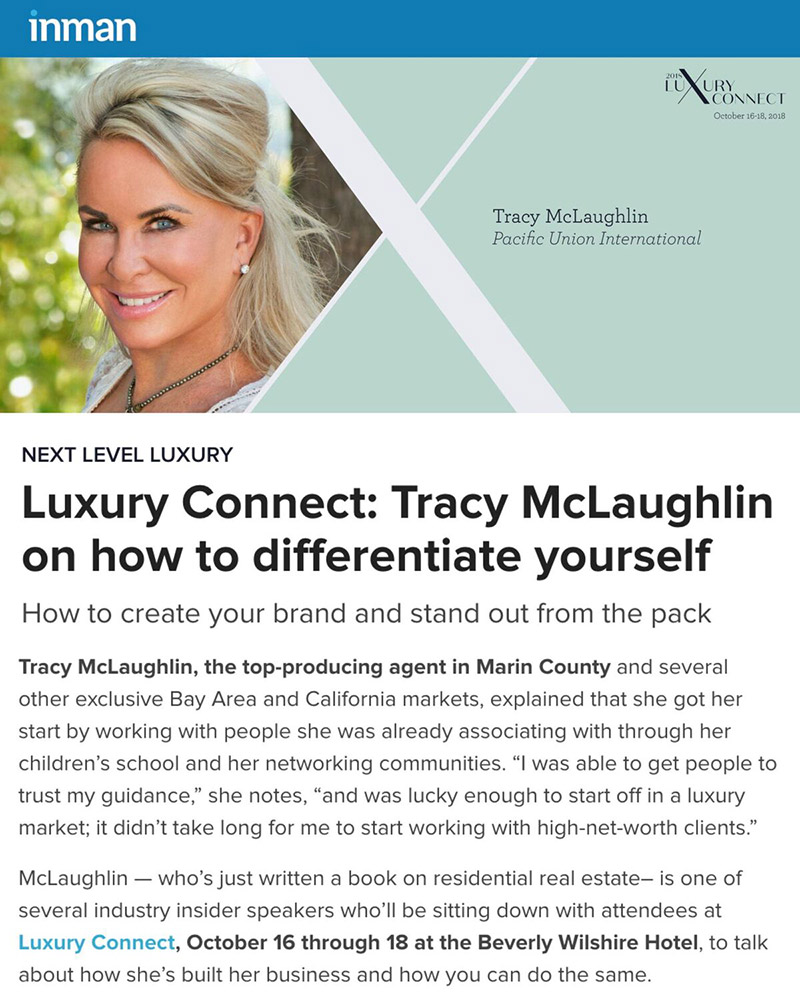

Luxury Connect: Tracy McLaughlin on how to differentiate yourself

How to create your brand and stand out from the pack
Tracy McLaughlin, the top-producing agent in Marin County and several other exclusive Bay Area and California markets, explained that she got her start by working with people she was already associating with through her children’s school and her networking communities. “I was able to get people to trust my guidance,” she notes, “and was lucky enough to start off in a luxury market; it didn’t take long for me to start working with high-net-worth clients.”
McLaughlin — who’s just written a book on residential real estate– is one of several industry insider speakers who’ll be sitting down with attendees at Luxury Connect, October 16 through 18 at the Beverly Wilshire Hotel, to talk about how she’s built her business and how you can do the same.
“It’s all about branding,” McLaughlin states. “Any business, whether you’re selling yourself or you’re selling a house, becomes a brand, and it’s all the same tenets of business. You can’t be another genericized line in the marketing language of agents; you’ve got to figure out exactly what separates you from the pack.”
McLaughlin has become known particularly for renovating homes, polishing them until they shine. “I try to help a lot of peers, and they’ll tell me, ‘Well, I don’t know how to renovate homes like you do — I don’t have that,’” she says. “And I’ll sit with them and ask, ‘What do you have? What knowledge are you bringing to the table?’ Maybe you went to law school and you understand how to protect people, and if someone buys or sells homes with you, you’ll have the best legal eyes; you can parlay that into real estate experience. Construction and design experience, or tireless hours spent with someone to ensure they’re making the best capital investment.”
Hear McLaughlin talk about how to stand out from the pack in real estate at Luxury Connect.
What do you think the luxury agent of the future looks like?
A lot of people keep talking about the disruption of technology in real estate and how it will supplant the need for Realtors — I don’t think I’ve ever felt further from that in my life. Technology cannot guide the seller through the management of the process or predict market troughs. There’s no technology that can replace that. The luxury agent of the future will understand how to reach big numbers of people through technology and make visiting the home an easier, more navigable process — yes. But will they ever be supplanted in terms of their intelligence? No. It’s still a business of human connection, explanation, talking people off the ledge, talking them through price reductions. All of those things need human beings, and that’s one of the reasons why I feel the industry is going to be protected. There’s no way this job could be done by a robot — not unless the country wants to sign up for the fact that algorithms are going to tell them what their home is worth; that’s just not going to happen. It’s going to be buyer demand, seller demand, economic shifts, levels of design improvements — my book is about all these topics.
What do you feel are the challenges facing the luxury market this year?
I think it’s high expectations based on the last five-year run-up. Our market started going up in 2013. The biggest problem is somebody who bought or over-improved in the last year or two, they think that asset is worth whatever they paid for and whatever they have into it, plus some commissions, plus some profit — it’s not. The years 2014, 2015 and part of 2016 were way bigger markets than we have now. So part of our job is saying “there was great appreciation up until 2017 but it’s table-topped since then, and if you bought something in 2016 and over-improved it, you’re not going to get out of it what you put into it.” The hardest part of being a luxury agent right now is explaining this to people. People make these decisions and maybe their job changes — maybe they’re getting divorced — and houses are not bank accounts. They’re places where people eat, breathe, sleep. What would it cost you to live in a nice hotel room every day for years? Isn’t that worth something? The idea that homes are these liquid stock portfolios is erroneous.
What are some of the biggest problems you’ve faced in growing your business?
Honestly, I haven’t had a problem growing it. It grows every year bigger and bigger. I haven’t had a problem. I’ve been the top person for 10-15 years in this county.
How has technology changed your business, and what are you most intrigued by that you’re not currently using?
Technology has changed the business just so much as buyers are almost as educated as agents on the value of a home before they walk into it. They don’t even need to see it to know if it’s overpriced. It’s given buyers a much bigger knowledge base, and it’s made access to the listings and all the marketing a lot easier. It’s taken a lot of pressure off me as a buyer’s agent because my buyers are looking on their own and if they see something they like, they’ll reach out. But that can be dangerous because you can be so out of touch with them that someone else grabs them and sells them a house.
I have a virtual reality consultant coming in here tomorrow to pitch us on why we should be using VR, but right now I’m not using that. I have a PR firm in LA and they pitch my listings; they have been incredible, and I really use them other than pitching my listings. I wouldn’t call that tech, but the PR firm who is blasting my stuff to websites, Curbd and websites all over the place. I don’t think a ton of my colleagues would spend money on that.
We’re also pushing data from websites showing web hits, clickthroughs — we summarize that for sellers every week. And if this VR pitch is cutting edge and will make a difference for our clients, we’ll do it, but not if it’s not really going to enhance their user experience.
What’s the question you hear most from your clients? And what’s your answer to them?
People always say “how’s the market,” and that is a really difficult question. I just set a record in one community last week on a house I sold, and there are three homes right now I’m not selling. It’s a very divided market right now, and that’s a complex question. The market is strong for homes that are move-in-ready and are priced exactly right.